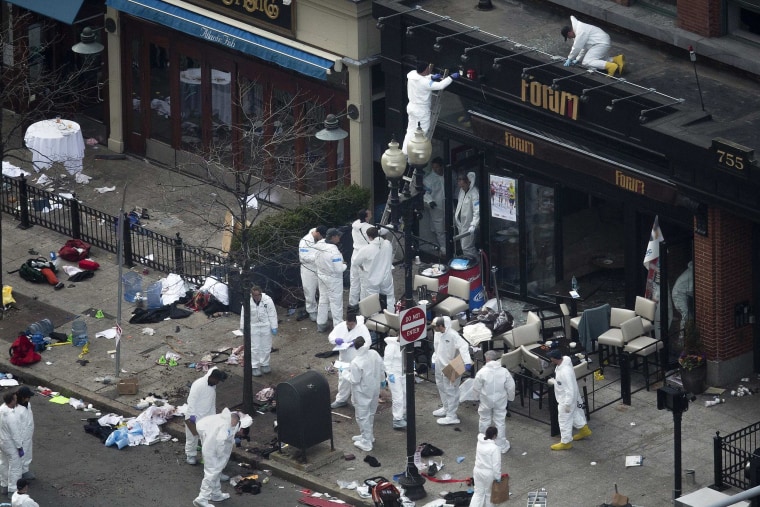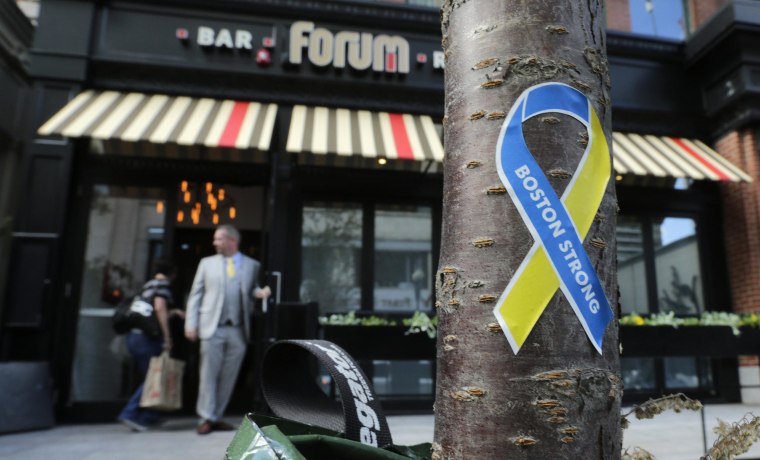Their stores or restaurants were closed for days, weeks, or even months in some cases, but many business owners impacted by the 2013 Boston Marathon bombing have emerged from the tragedy stronger than ever.
"The city really rallied around all the businesses that were affected," said Erinn Fleming, director of events and marketing at Forum restaurant on Boylston Street, where the second bomb went off on April 15, 2013. Forum, which was closed for four months after the marathon, was the last business to reopen.
When the restaurant was able to welcome diners again last summer after renovations and repairs, customers flocked in.
"People came in to support us. People were really excited when we opened," Fleming said. The restaurant experienced an initial spike in business, she said, and then things returned pretty much to normal.

The tragedy — which killed 3 people and injured more than 260 — inspired Fleming to run her first Boston marathon. On April 21, she'll be one of an expected 36,000 runners in the race.
"I'm terrified," she said of trying to complete her first marathon. But she and other employees at the restaurant have no concerns about their safety.
"We're working with the city," she said. "We're feeling pretty confident that the security measures will be in place, and that everyone, on the streets, running, and in the businesses will be taken care of."
Downs and Ups
For more than a week after the marathon, the crime scene, which stretched for blocks on Boylston Street, was cordoned off by police. Whether shops had sustained damage or not, they lost hundreds of thousands of dollars due to the shutdown.
Proprietors have faced other issues with recovery, too. Ed Borash, president of Sir Speedy print and copy shop — the longest running business on Boylston Street — actually had insurance to cover damages from a terrorist attack, but his insurer hasn't paid out yet.
"We probably lost close to a million dollars in sales," he said of the 12 days the shop was closed after the attack, and the lingering effects on his business as regular customers switched to different copy stores during those days. "We had to throw out $21,000 worth of jobs because we couldn't go back into the store."
Business is still shaky, he said.
"People don't come back to an area where something bad happened," he said. "If they have a choice, they go elsewhere."
But Marathon Sports, a running store in front of the first blast, experienced a boost similar to Forum's when it was able to open again.
On the day of the bombing, Marathon Sports employees had grabbed clothing off the store racks, using items as tourniquets to treat victims. Runners who had just finished the marathon helped too, said Shane O'Hara, store manager.
"Everyone totally chipped in and did what we hope great Americans would do," he said.
Part of its glass storefront was blown out, and Marathon Sports was closed for 10 days. It "was a big hit to the company," O'Hara said.
"What we didn't anticipate is then how much support we'd have once we opened up our doors. It's remained ever since," he said.
Once they reopened, strangers came by to thank the staff, O'Hara said. Restaurants delivered free pizza and Chinese food, candy, and flowers. But most importantly, O'Hara said, was the shoppers who came in to buy "Boston Strong" T-shirts, proceeds of which go to survivors through Boston's One Fund.
"We were stocking that thing every hour," he said. Sales have slowed down since then, but employees still need to re-stock the shirts every two days.
"It's a great thing to see," said O'Hara, who sometimes still has trouble sleeping because of what he saw that day.
Back to Normal
Meanwhile, at The Tannery clothing store, which is located between the two blast sites on Boylston Street, the influx of tourists who came to Boston in the marathon's aftermath was great for business — for about two months. Now everything is back to normal, said manager Darren Malatesta, including the mindset of employees who were there for the tragedy.
"We don't really talk about it too much," he said of the bombing. "It slips your mind from time to time, so even though it was such a major and traumatic event for the city's timeline, you kind of go back to normal after a certain amount of time."
About 500 businesses in total were affected by the marathon bombing, said Sheila Dillon, director of the Department of Neighborhood Development for the city of Boston.
"[Businesses in the impact area] were shut down for a significant amount of time, even if they didn't sustain physical damage," she said. "Most of them recovered quickly."
For some businesses, however, nearly a year after the bombings, insurance issues still have yet to be resolved. Insurers rejected nearly half of the 133 bombing-related claims that cited losses from business interruption, according to the Boston Globe.
